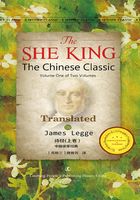
TS'AE FAN
1 She gathers the white southernwood,
By the ponds, on the islets.
She employs it,
In the business of our prince.
2 She gathers the white southernwood,
Along the streams in the valleys.
She employs it.
In the temple of our prince.
3 With head-dress reverently rising aloft,
Early, while yet it is night, she is in the prince's temple;
In her head-dress, slowly retiring,
She returns to her own apartments.


Ode 2. Narrative. THE INDUSTRY AND REVERENCE OF A PRINCE'S WIFE, ASSISTING HIM IN SACRIFICING. Here we must suppose the ladies of a harem, in one of the States of the South, admiring and praising the way in which their mistress discharged her duties;—all, of course, add the commentators, through the transforming influence of the court of Chow. There is a view that it is not sacrificing that is spoken of, which I will point out in a concluding note.
St.1. L.1. Maou says 于=於, which it is in the next line; but 于以 cannot be so construed. K'ang-shing and Ying-tah, seeing this, made 于=往, which would do in the 1st line, but not in the 3d. Our best plan is to take 于 and 以 together as a compound particle,untranslateable; so, Wang T'aou (于以猶薄言, 皆發聲語助也). 蘩 is, no doubt, a kind of artemisia, and is defined as白蒿, after which Medhurst terms it 'white southernwood'. Its leaf is coarser than that of the other haou, with white hairs on it. It does not grow high,like some other varieties, but thick. The fan was used both in sacrifices, and in feeding silkworms. L.2.沼is a pool or natural pond, of irregular crooked shape,distinguished from 池, which is round. The general name for island is 洲; a small chow is called 渚; and a small choo, 沚. The fan is not a water plant, so that we must take 于 as= 'by', 'on'. L.4. By 事 we must understand the business of sacrifice,the business, by way of eminence. The sacrifice intended, moreover,must be celebrated in the ancestral temple, within the precincts of the palace, as the lady could take no part in sacrifices outside those. 公侯,—together, as in i. VII. The lady's husband might be a 公 or a 侯.
St. 2. 澗 is 'a stream in a valley (山夾水)'. Here, however, the idea is more that of a valley with a stream in it. 宮=廟, 'the ancestral temple'; so, often in the Ch'un Ts'ëw.

